I have three tabs in my tab control that I can click through freely and everything works as planned. However, the second I interact with the current tab, the next couple tab changes locks up the tab control to the point where I cannot change a tab and forced to reopen the program. I have tried using custom tab controls, using a content presenter, and data templates but this tab control still locks.
Here is what it looks like normally:
Here is what it looks like when frozen:
This is my tab control in the view:
<controls:ViewModelToViewConverter x:Key="ViewViewModelConverter"/>
...
<TabControl SelectedIndex="{Binding SelectTabIndex, Mode=TwoWay}" >
<TabItem x:Name="ApInvoicesTab" Header="AP Invoices" >
<ContentControl Content="{Binding CurrentViewModel, Converter={StaticResource ViewViewModelConverter}}"/>
</TabItem>
<TabItem x:Name="ArInvoicesTab" Header="AR Invoices" >
<ContentControl Content="{Binding CurrentViewModel, Converter={StaticResource ViewViewModelConverter}}"/>
</TabItem>
<TabItem x:Name="HistoryTab" Header="History">
<ContentControl Content="{Binding CurrentViewModel, Converter={StaticResource ViewViewModelConverter}}"/>
</TabItem>
</TabControl>
The converter:
public class ViewModelToViewConverter : IValueConverter
{
public object Convert(object value, Type targetType, object parameter, CultureInfo culture)
{
if (value == null) return null;
//use naming convention or custom settings here to get view type
var viewModelType = value.GetType();
var viewType = Type.GetType(value.ToString().Replace("Model", ""));
var view = (FrameworkElement)Activator.CreateInstance(viewType);
view.DataContext = value;
return view;
}
}
Main View Model (which is the datacontext for the main view with the tabs):
//private properties
private int _selectTabIndex;
private ViewModelBase _currentViewModel;
private List<ViewModelBase> _viewModels;
//Constructor
public MainViewModel()
{
try
{
_viewModels = new List<ViewModelBase>
{
new ApInvoiceViewModel(),
new ArInvoiceViewModel(),
new InvoiceHistoryViewModel()
};
PropertyChanged += MainViewModel_PropertyChanged;
CurrentViewModel = _viewModels[0];
((IRefreshable)CurrentViewModel).RefreshData();
}
catch (Exception e)
{
}
}
//Command that displays correct viewmodel
public RelayCommand<object> SetCurrentViewModelCommand
{
get
{
return _setCurrentViewModelCommand ?? (_setCurrentViewModelCommand = new RelayCommand<object>(
(getType) =>
{
try
{
if (getType != null)
{
_messageService.ShowWorkingMessage();
CurrentViewModel = _viewModels[(int)getType];
if (CurrentViewModel is IRefreshable)
((IRefreshable)CurrentViewModel).RefreshData();
_messageService.HideWorkingMessage();
}
IsLoading = false;
}
catch (Exception e)
{
IntegratorJobDAL.SetIntegratorJobError(0, e.ToString(), GetType().Name);
_messageService.ShowErrorMessage(e.Message);
}
}
));
}
}
//public properties and propertychanged
private void MainViewModel_PropertyChanged(object sender, PropertyChangedEventArgs e)
{
if (e.PropertyName.Equals("SelectTabIndex"))
{
SetCurrentViewModelCommand.Execute(SelectTabIndex);
}
}
public int SelectTabIndex
{
get { return _selectTabIndex; }
set { Set("SelectTabIndex", ref _selectTabIndex, value); }
}
public ViewModelBase CurrentViewModel
{
get { return _currentViewModel; }
set { Set("CurrentViewModel", ref _currentViewModel, value); }
}

